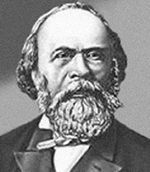Lev Tsenkovsky
This article has multiple issues. Please help improve it or discuss these issues on the talk page. (Learn how and when to remove these messages)
|

Lev Semyonovich Tsenkovsky (Template:Lang-ru) (October 1 (N.S. October 13), 1822 in Warsaw – September 25 (N.S. October 7), 1887 in Leipzig) was a Polish-Ukrainian botanist, protozoologist, bacteriologist, who was mostly active in Ukraine, then part of the Russian Empire. He was a corresponding member of the Saint Petersburg Academy of Sciences (1881).
Lev Tsenkovsky graduated from Saint Petersburg University in 1844. As a professor, he taught at the Demidov Lyceum in Yaroslavl (1850-1854), Saint Petersburg University, Novorossiysk University in Odessa (1865-1871), and Kharkov University (1872-1887). Lev Tsenkovsky was one of the pioneers of the ontogenetic method of studying lower plants and lower animals. Also, he was developing a concept on genetic unity of flora and fauna. Tsenkovsky was one of the advocates of the teachings of Charles Darwin. He is known to have suggested methods of developing an effective anthrax vaccine. Lev Tsenkovsky contributed to the organization of the first vaccination station in Kharkov in 1887.
This article includes content derived from the Great Soviet Encyclopedia, 1969–1978, which is partially in the public domain.
